
May 2006

DUANE READE CASE SETTLED!
ACCESS IS GOOD FOR BUSINESS
by Jean Ryan
After almost five years of litigation, Disabled In Action’s access lawsuit against the Duane Reade drugstore chain has been settled, and it affirms our civil right to shop by being able to do such things as pass through store aisles, reach counters and credit card swipe machines, and communicate privately with pharmacists. We are looking forward to the improvements that Duane Reade has promised to make.
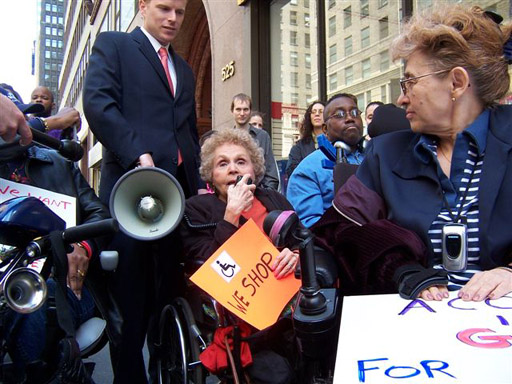 |
| Carr Massi, DIA President, speaking Photo by Marianne Lado |
Magistrate Debra Freeman, of the U.S. District Court, Southern District of New York, signed the consent decree on January 24, 2006, to end the lawsuit that Disabled In Action and 10 named plaintiffs initiated with New York Lawyers for the Public Interest, Inc. and Fish and Neave, LLP (now Ropes and Gray, with one of our principal attorneys now at Wilmer, Cutler, Pickering, Hale, and Dorr, LLP). Judge Freeman’s order came more than a year after the parties agreed to avoid trial and settle on many issues. The two issues the parties could not agree on, and which Judge Freeman ruled on, were standards for stock in the aisles and whether or not the terms of the consent decree would be confidential. In a victory for Disabled In Action’s long held view that civil rights cases have to be public knowledge, Judge Freeman ruled that the settlement and her decision would be open to the public, not confidential, but that the parties must try to collaborate on press about the case.
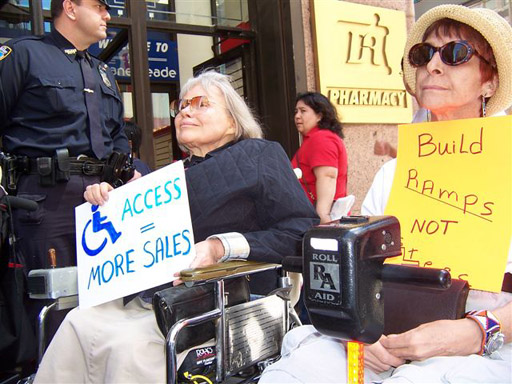 |
Activists Anne Emerman (left) and Fusun Ateser (right) with signs reading ACCESS EQUALS MORE SALESand BUILD RAMPS NOT STEPS Photo by Marianne Lado |
It is Disabled In Action’s view that through publicizing information about civil rights cases, other people with disabilities can be inspired and encouraged to fight for their civil rights, and hopefully other businesses will realize their responsibilities and provide access without expensive, time-consuming litigation.
While several recent articles in the popular media have characterized Duane Reade stores as cluttered, too often, people with mobility and sensory disabilities have experienced their stores as inaccessible. We have been unable to get into some stores because of steps, locked doors(!), blocked entryways, or double sets of doors that don’t allow enough clearance between them for a wheelchair. Thanks to the lawsuit settlement, most of these problems will be surveyed and corrected within two years.
Once in a store, we often could not get through the aisles because of displays on the floor or stock in the aisles or because of the way shelves (gondolas) are placed. Duane Reade has agreed to provide 36" of clear aisle space (typically the width of 3 floor tiles) with the exception of infrequent, very small sections of 32" width where the larger width is impossible to achieve.
Hooray! Not being able to get to merchandise has been frustrating, but literally being blocked by heavy boxes of merchandise or by empty boxes in a narrow aisle or in an elevator, unable to get out, and yelling for help, are experiences we are happy to put behind us.
After Judge Freeman participated in discussions with each side, Duane Reade offered to pack out (put away) new merchandise in 2, 4, or 6 hours (depending on the store) after the delivery truck leaves, and Judge Freeman incorporated this into her order. "That will be a great improvement over having merchandise on the floor blocking the aisles,",
said Marty Sesmer, a plaintiff.
Duane Reade officials also agreed to lower high counters to 37" and in new stores have them be 36", and to have a private telephone to the pharmacist in bi-level stores without an elevator. No longer will a clerk be an intermediary when we have to communicate with the pharmacist about medication.
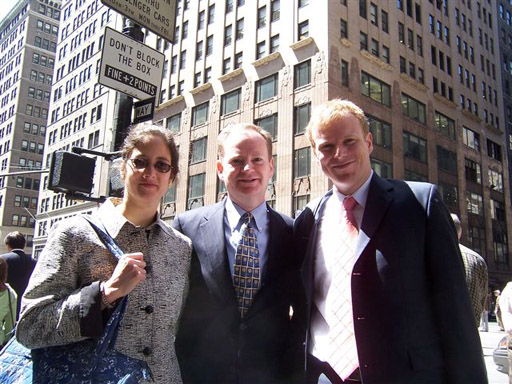 |
| Three of our Lawyers – Marianne Lado (left) and Gavin Kearney (right) from NYLPI and William McCabe (center) from Ropes & Gray Photo by Jean Ryan |
Disabled In Action would like to thank New York Lawyers for the Public Interest, Inc., especially Marianne Lado, Dennis Boyd, and Gavin Kearney, as well as Ropes and Gray, LLP (formerly Fish and Neave, LLP) attorneys, especially William McCabe, Stanley Liang, Tom Vetter, Paul Keller (who is now at Wilmer, Cutler, Pickering, and Hale, LLP), Nina Horan, Shazi Malik, and Spencer Yee for their tireless, dedicated, and excellent work on this case. They attended countless meetings, calls, wrote depositions, e-mails, letters, and briefs, and researched the issues, surveyed stores, watched security tapes, and gave their time to come to DIA meetings to explain and discuss the issues.
DIA plaintiffs and officers put in a great deal of work, too, in this case. Sometimes suing seems easy because a disability rights group may think that the lawyers will do all the work and we’ll get everything we want, everything that is necessary for access. The real world does not work that way.
We talked with our lawyers from the very beginning, telling them about access problems. We surveyed stores. We had conference calls and meetings at their offices and at DIA meetings. We had to provide documents, receipts, letters, e-mails, even our wheelchair and scooter manuals(!).
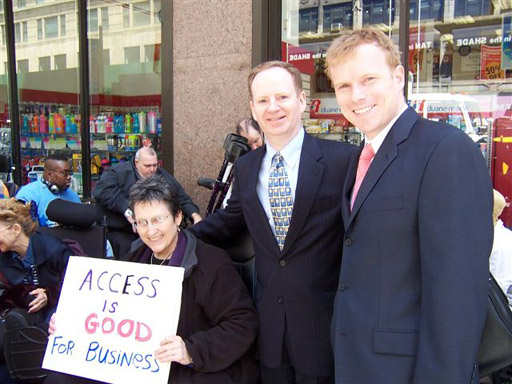 |
| Jean Ryan (left) with attorneys William McCabe (center) and Gavin Kearney (right) Photo by Marianne Lado |
A number of plaintiffs and DIA officers were singly deposed (asked questions) in a room by Duane Reade lawyers for several days in 2004. It was grueling for all of us. I am very sensitive to cold and drafts, and, even though the weather was 95 degrees outside, I actually brought winter clothes and wore a blanket on the second day to cope with the cold inside. We were asked all kinds of questions about DIA and about store access, like when we could not get down an aisle, what did the outside of the boxes say?
Frieda Zames, bless her heart, was deposed on behalf of DIA. She was asked about her Duane Reade shopping experiences by the attorney for Duane Reade. If you knew Frieda, who died last year before the conclusion of this case, you knew she was not a shopper. Her partner, Michael, did all the shopping. As Frieda reported it, the deposition went something like this:
DR Lawyer – "What have been your experiences shopping in Duane Reade stores?"
Frieda – "I don’t shop. I have not shopped in a Duane Reade store, but I want them all to be accessible."
DR Lawyer – "What? You don’t shop?"
Frieda – "No, I don’t."
DR Lawyer – "Then what are you doing here?"
Frieda – "I am here to represent DIA and answer questions about it."
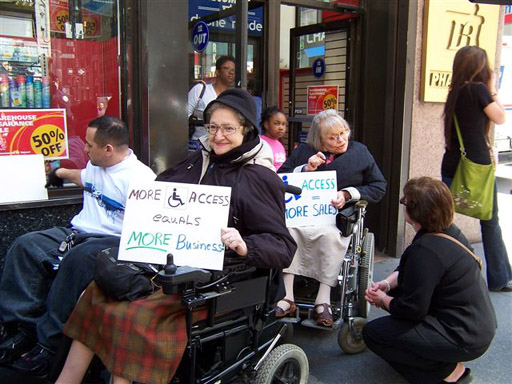 |
| More access equals more business Photo by Marianne Lado |
Several of us went to court for long days. The first few days we were there, we actually had to go to the security office and be escorted to the hidden, locked accessible restroom. After complaining mightily that this was like kindergarten and is not what other people have to go through, we progressed to being able to independently get into the rest room, but it was still hidden and unmarked.
We also prepared for a trial that was to be held in mid-December, 2004. We found people to attend court every day, even in holiday season, but both sides were able to agree to settle on the eve of the trial so we did not have to go to trial. The two issues that the sides could not agree on, stock in the aisles and whether or not the case would be confidential, were decided in January 2006 by Judge Freeman.
Any lawsuit is hard work and is a gamble; you never know what the judge will order or what the two sides will be able to agree on. Also, the ADA does not mandate total access. While we sought only access for the plaintiffs and not money, Duane Reade agreed to donate $50,000 to Disabled In Action so we can continue our work.
Our lawyers repeatedly told us that in a settlement agreement, it is a good agreement if neither side is totally happy because you each have to compromise to agree. An example of something we wanted but could not get is the total elimination of displays in the aisles. As long as Duane Reade keeps 36" clearance in the aisles, they can have displays because we can still get through, and if merchandise is blocked by the displays, it is blocked for everyone, not just for people with disabilities.
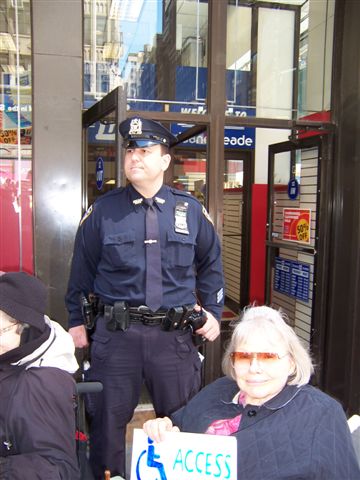 |
| Every press conference needs a cop Photo by Marianne Lado |
Another thing we wanted was access to every pharmacy, even those currently on an inaccessible level, but the ADA does not require an elevator in every store, nor is there necessarily room for an elevator in every bi-level store.
The third thing we wanted and could not get, that the Kmart plaintiffs got (see http://www.foxrob.com/pleadings/Kmart/Settlement%20Agreement%20-%20no%20exhibits.pdf, section 14.7) was for Duane Reade to agree to tie accessibility to the managers’ evaluation, promotions, and pay because accessibility is not just structural – it is often a matter of practice, of people’s behavior to keep the aisles clear. Hopefully, Duane Reade will realize as a company that this is a good way to assure access.
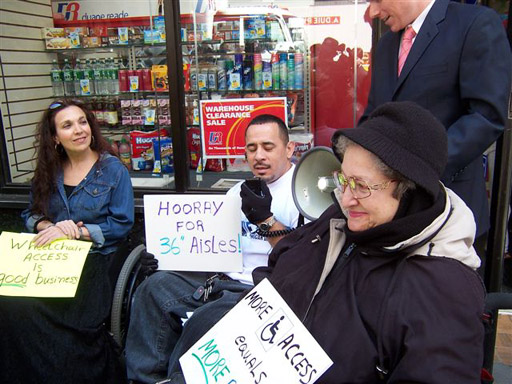 |
| Ramon Santos of CIDNY speaking Photo by Marianne Lado |
Follow-up is necessary for any settlement agreement and order. Duane Reade will have two years to make changes to all its stores which need it, but the 20 exemplar (sample) stores specifically noted in the agreement have to be modified within 6 months of Judge Freeman’s signing the consent decree. Employees have to be retrained and pack-out policies that maximize accessibility have to be followed immediately. If problems come up, we need to report them. Duane Reade is required to post a customer service number in all of its stores, and it will have boxes for written complaints in some. It is important that anyone with an accessibility problem in a Duane Reade store report it directly to Duane Reade-they are only responsible for fixing problems of which they have notice. It is also important that we be informed of any accessibility problems so that we can ensure that they are properly reported and addressed by Duane Reade. The complaint forms will be available on DIA's website (www.disabledinaction.org) and a dedicated, toll-free telephone number is available through New York Lawyers For The Public Interest for reporting such problems. It is 1-888-DIA-DIA-8 (1-888-342-3428). If the parties cannot agree that something needs fixing, the settlement calls for a "neutral person"
, who is an accessibility expert, to settle that specific issue.
After all, access is good for business. We are customers. We buy, too, and where we can go, people with baby strollers and shopping carts follow. What store wouldn’t want more customers?
Editor’s note: Judge Freeman’s order and the DIA vs. DR consent decree are available on DIA's website at www.disabledinaction.org. The Kmart settlement is available at http://www.foxrob.com/pleadings/Kmart/Settlement%20Agreement%20-%20no%20exhibits.pdf.
Gavin Kearney contributed to this article.
More Duane Reade press conference photos on our website at www.disabledinaction.org